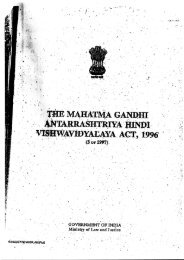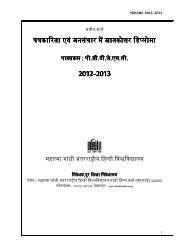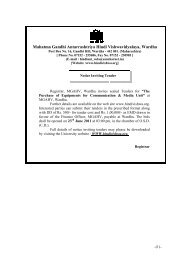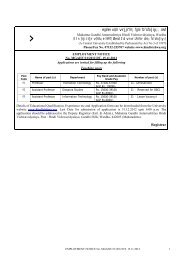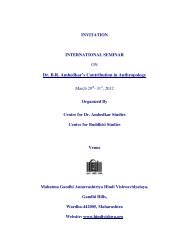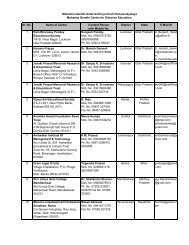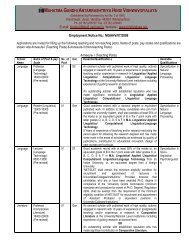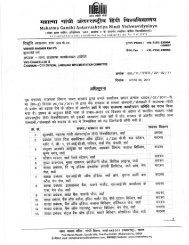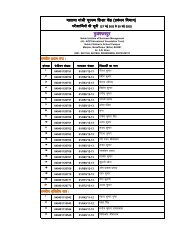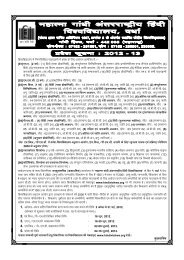fहndi - Mahatma Gandhi Antarrashtriya Hindi Vishwavidyalaya
fहndi - Mahatma Gandhi Antarrashtriya Hindi Vishwavidyalaya
fहndi - Mahatma Gandhi Antarrashtriya Hindi Vishwavidyalaya
Create successful ePaper yourself
Turn your PDF publications into a flip-book with our unique Google optimized e-Paper software.
of power of the original to be translatedfor making the effect of the original. Theopening comment of the translation criticin <strong>Hindi</strong> is that "The language of The Godof Small Things is overpowering. For thetranslator this strong, fore-groundedpresence of the parent language createsproblems." Raji, is quite convinced thatmastering the target language <strong>Hindi</strong> is notenough to create the nuances of the originalsince the content of the novel is encodedin two-three languages, by deconstructingthe traditional writing style.As the English publisher of the booktook meticulous care about the typeset,cover design and other details of the qualityand publication and the publicity the bookreceived was undoubtedly the result of awell-planned strategy, a fact so muchemphasized by her detractors, it is bindingon the translators to keep all of them intheir re-renderings. We have both <strong>Hindi</strong>and Malayalam, the Indian languagetranslations of Mrs. Roy, which had thesimilar cover designs of the original.Arundhati took freedom to arrange eachword as in English Capital letters, whichshe retained from her childhood. That issaid to be an innovation in language ofsource text. In characterizing BabyKochamma, the novelist had the sametechnique of depicting her life backwards.Regarding the calligraphy of English whatthe original text attracts and creates bestimpact on the context of rendering, is thecapitalising of the beginning of someselected words, wherever there are stressesand intonations. Non-English phraseswhich are italicized include those inMalayalam as well as the Latin "εt 'tu:bru:tε?” the <strong>Hindi</strong> & Malayalam mixedslogans 'Inquilab Zindabad! Thozhilali EktaZindabad!" (Arundhati, 66), and the Tamil'Rombo maduram'; expressions inMalayalam, such as 'Ruchi lokathindeRajavu,' and its literal translation of'Emperors of the Realm of Taste'(Arundhati, 46); (The novelist herself hadcommitted that the translation isridiculous.) To quote : 'It was a literaltranslation of Ruchilokathinde Rajavu,which sounded little less ludicrous thanEmperors of the Realm of Taste. (Ibid).Malayalam translator did some overttranslations on similar occasions and addedboth the source and target idioms andphrases, viz. in transliteration and shifting,to communicate the original (Priya, 65).<strong>Hindi</strong> translator had a recreation of theoriginal as he translated the term as —Swaad Ke Sansar Ke Samrat, (Neelabh, 60)to be faithful to the TL readers, where hecould create the alliterations by using therepeated consonants S & K in each word,and we have to forgive for making themeaning of the whole phrase in plural -viz. Ke Sansar, Ke Samrat etc.The children's extraordinary habit ofreverse reading, of words as seen reflectedin a mirror, is also given emphasis in asimilar way : "ehT serutnevdA fo eisuSlerriuqS. enO gnirps gninrom eisuSlerriuqS ekow pu. None of the translatorsin Malayalam or <strong>Hindi</strong> could becomefaithful to this craft. They would hesitateto tell that the Indian Language scripts134 :: April-June 2013fgndi •



